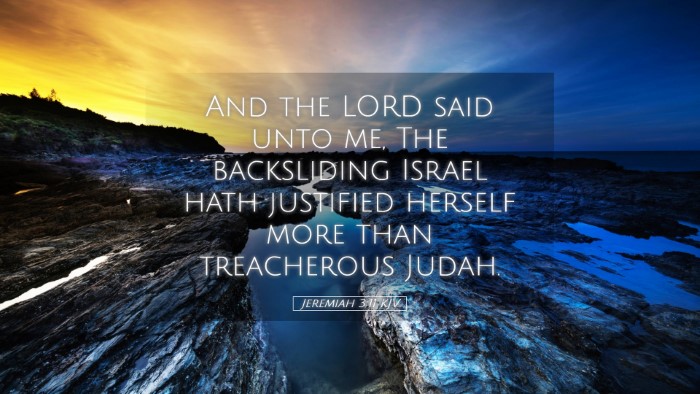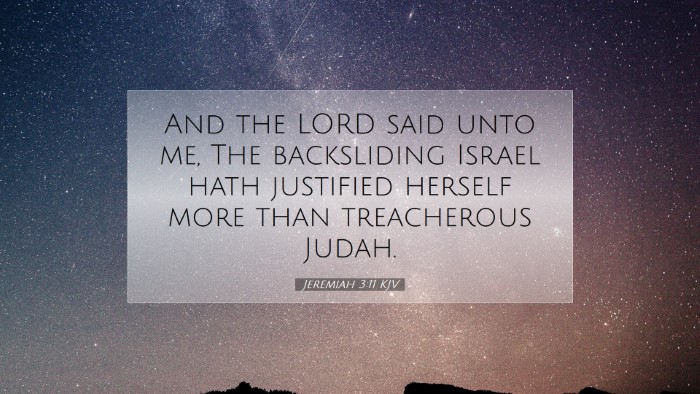Commentary on Jeremiah 3:11
Jeremiah 3:11 states: "And the LORD said unto me, The backsliding Israel hath justified herself more than treacherous Judah." This verse comes amid Jeremiah's poignant declarations concerning the Israelite communities, illustrating a stark contrast between Israel and Judah, and provides deep insights into the nature of divine judgment and human behavior.
Contextual Background
To fully appreciate this verse, it is essential to understand the historical backdrop of Israel and Judah during Jeremiah's prophecies. The nation of Israel had already faced destruction and exile due to its persistent idolatry and rebellion against God. In contrast, Judah, though still standing, was also steeped in similar sins.
The Deliberate Contrast
God's declaration presents a counterintuitive observation: Israel, despite her many transgressions, is seen as being 'less guilty' than Judah. This remark is not a license for Israel's behavior but highlights the seriousness of Judah's betrayal—specifically, that Judah, who should have known better, went further into betrayal and treachery.
Insights from Matthew Henry
According to Matthew Henry, this verse reveals the folly of presumption among those who should have been faithful. Henry emphasizes that Israel's actions, though they led to her downfall, left her in a state of comparative innocence when juxtaposed with Judah's deeper treachery. He argues that the comparison exposes Judah's gross ingratitude, considering the blessings they received from God.
Insights from Albert Barnes
Albert Barnes elaborates on this theme by indicating that Israel's backsliding was, in a sense, a result of external pressures that provoked their behavior. In contrast, Judah's defection was within their control. Barnes points out that Judah remains unrepentant, exhibiting a more willful rejection of God’s commands. Thus, the culpability of choice becomes a critical element in understanding God’s assessment of their actions.
Insights from Adam Clarke
Adam Clarke contributes to the analysis by referring to a principle of righteousness, suggesting that this divine judgment highlights the nature of accountability. He suggests that Israel’s reliance on external nations to save them from their plight reflected misplaced trust, while Judah's deliberate deviation from faithfulness signified a deeper rebellion. Clarke states that God's judgment is not solely based on actions but also involves the heart's orientation towards God.
Theological Implications
Jeremiah 3:11 carries significant theological implications that extend beyond its historical context. It challenges believers to examine the nature of their faithfulness to God amidst moral failures.
- Understanding Backsliding: The term "backsliding" indicates a movement away from God, not merely in action but in heart and mind. It serves as a potent reminder that infidelity to God often manifests in both actions and attitudes.
- Corporate vs. Individual Sin: This verse illustrates the dynamics of corporate guilt. The corporate sin of Judah reflects how community and leadership influence individual choices. It underscores the importance of responsibility within the community of believers.
- The Nature of Divine Judgment: God’s justice is portrayed as both firm and fair. The direct comparison illustrates that divine judgment is based on knowledge and revelation—Judah betrays through ungratefulness while Israel did so from ignorance.
- The Hope of Restoration: While judgment is a theme, so is hope. The mentioning of Israel's condition hints at the possibility of repentance and restoration, a recurring theme in Jeremiah. God's voice beckons back both Israel and Judah towards a path of restoration.
Conclusion
In Jeremiah 3:11, we encounter a critical reflection on the nature of sin, judgment, and the hope for redemption. The insights from public domain commentaries enrich our understanding of this verse through various lenses—historical, theological, and practical. As pastors, students, theologians, and scholars engage with this text, may it challenge them to consider not only corporate faithfulness but also individual responses to God's call for repentance and return.


